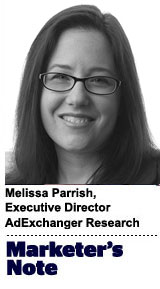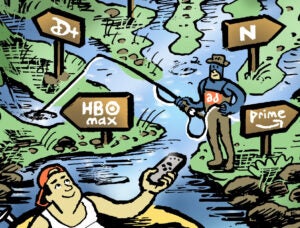 “Marketer’s Note” is a regular column informing marketers about the rapidly evolving, digital marketing technology ecosystem.
“Marketer’s Note” is a regular column informing marketers about the rapidly evolving, digital marketing technology ecosystem.
This week it is written by Melissa Parrish, Executive Director, AdExchanger Research.
Over the last couple of weeks, most of the conversations I’ve been having with marketers and tech companies have in some way revolved around the lead up to our Programmatic I/O conference this Thursday. The most interesting question came from the CMO of an ad tech company, who wanted to know, “What event are you guys gonna do when we don’t have to talk about programmatic anymore?”
It’s a compelling question because there will certainly be another “next big thing” for advertising at some point. But instead of considering what that next thing might be, I’ve been thinking about the second part of his question: How long before programmatic is so mainstream and so stable that we don’t need to dedicate an event or two to it? And the problem with figuring out the answer – or one of many problems with trying to guess – is that if the only people you’re talking to are other industry insiders, it feels like we’re already there.
Take, for example, our agenda for this week. The panels are covering some really cool topics like B2B programmatic, the role of creative in programmatic, new data signals to add to audience profiles, and the current state of programmatic TV. But while I’m excited to hear what the panelists have to say about all of those topics, I’d bet it’s only the last one that’s going to have any strong disagreement among the speakers.
The reason is that unlike some of our other events – Clean Ads, for example, which is all about fraud – programmatic is, at least to insiders, totally uncontroversial to the point where we think of its future dominance as an inevitability. And while that is itself a hallmark of its mainstreaming, it’s really important that we continue having these conversations – even if they’re absent of controversy – because the rest of the business world does not necessarily agree with us yet. If they did, programmatic’s perfectly optimized future would already be here.
Remember that while various sources predict that programmatic will account for anywhere from 55-70% of digital ad spend in 2016, the rest of the digital dollars, not to mention the other roughly 70% of total marketing dollars, are not necessarily controlled by programmatic converts. And we can’t forget that there’s a crop of publishers out there who are still wary of the whole ad tech universe.
As an industry, we have a lot to be proud of, but we can’t be so focused on self-congratulatory back-slapping that we forget we have a lot of work to do both to perfect our strategies and products and to educate the newbies. The best way to stay fresh and discover our own gaps is to find that marketer who asks, “Wait, what does ‘programmatic’ mean?” and actually teach them what we know instead of just rolling our eyes and calling them old school. If we do that, someday we’ll able to focus on another exciting advertising innovation – but that day is still a long way off.












